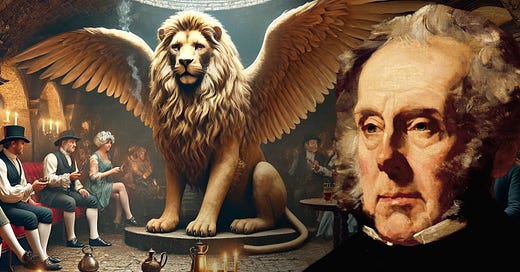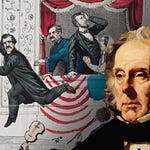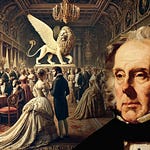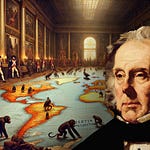Episode 03 - The Venetian Takeover of England: A 200-Year Project
Episode 04 - The Venetian Virus
Episode 05 - Bestial British Intelligence Of Shelburne and Bentham
Episode 07 - Palmerston Launches Young Turks to Permanently Control the Middle East
Episode 09 - Jim Crow, a Cultural Weapon in the Hands of the Confederacy
The Venetian oligarchy, known for its clandestine control and mystic ideologies, infected England with a strain of imperial ambition, setting it on a path toward financial tyranny and societal decay. This transformation, which began in the courts of Henry VIII and deepened through economic manipulation, ultimately turned England from a hopeful nation into a kingdom obsessed with control and colonialism. Venetian agents strategically embedded themselves in English society, cloaking their manipulative ambitions with mystical ideas and economic promises.
🧭 Venetian Influence in English Courts
Francesco Zorzi, a Venetian mystic with ties to influential elites, arrived in England as an advisor to King Henry VIII. Under the guise of guidance, he disseminated the mysticism and cabalistic ideas that became the undercurrent of a rising power elite. Zorzi’s doctrines echoed through English society, influencing poets, thinkers, and eventually political leaders. Followers like Philip Sidney and Edmund Spenser romanticized empire and crafted an image of England as a divinely ordained imperial power. This early foundation laid by Zorzi and the Venetian Party framed England’s destiny not around freedom but around control, fueling its future colonial pursuits.
🏛️ The Foundation of Financial Control
The establishment of the Bank of England in 1694 marked a pivotal shift from national economy to national debt, embedding a Venetian-inspired system where money could buy power, manipulate economies, and control empires. John Locke, one of the bank’s chief propagandists, cast the mind as nothing more than a blank slate, ripe for molding through sensation, detached from any higher human purpose. This “tabula rasa” was not just a theory; it became the rationale for a society where monetary worth was the only gauge of human value. Under Locke’s influence, the idea of “liberty” was reduced to a right to property—a formula for the wealthy to hoard wealth and the poor to pay for it.
The Bank’s system, characterized by massive debt and currency manipulation, served the interests of this new Venetian-English elite. Leaders of this faction, such as Charles Montagu, chancellor of the exchequer, cut English coinage nearly in half to exacerbate a currency crisis, then enacted new taxes to crush any resistance among the people. Newton, installed as the overseer of this “recoinage” project, debased his own dignity, using his niece as a pawn to secure his position in the elite circle.
📜 The Anti-Venetian Resistance
The Venetian Party faced fierce resistance, led by those who recognized the humanity lost to this Venetian poison. German philosopher Gottfried Wilhelm Leibniz articulated a vision of society based on the pursuit of happiness, charity, and the wisdom of creation. These ideas resonated deeply with those yearning for more than the greed-driven “liberty” Locke proposed. Jonathan Swift, England’s great satirist and Leibniz’s ally, battled Locke’s debasing theories, calling out the madness of the new elite. For Swift, the so-called rational philosophy of Locke, Hobbes, and Descartes was nothing more than a new mask for oligarchy—a twisted logic to justify bestializing the people.
Swift’s satire targeted the Venetian agents of empire, ridiculing them as madmen in his 1696 work, A Tale of a Tub. He saw clearly that these schemes would drive Britain to misery and poverty, where human worth was ascribed solely to wealth. His opposition had broad support among those who valued a society built on reason, charity, and happiness—a stark contrast to the hedonism and cynicism embraced by Britain’s new ruling class.
🔥 Corruption Takes Root: The Rise of Hell-Fire Clubs
The Venetian Party’s hegemony reached new depths with the rise of the Hell-Fire Clubs. These secret societies, devoted to indulgence and depravity, became havens for Britain’s degenerate elite. By the early 1700s, these clubs embodied the moral decay that had spread from Venice, promoting a worldview where personal vice supposedly benefited society. As Bernard Mandeville argued in The Fable of the Bees, indulgence was a social good, a warped rationale used to justify the debauchery of Britain’s highest ranks. This perverse ideology tore at the fabric of English society, amplifying inequities and diminishing the quality of life for its people.
🌍 Impact on America: The American Dream Takes Root
In contrast to the poisonous influence in England, a resistance movement took root in America. Anti-Venetian ideas, particularly those of Leibniz and Swift, inspired the founders of the Massachusetts Bay Colony and later Benjamin Franklin. Jonathan Swift supported American leaders in their call for independence, creating a foundation for the American ideals of happiness and liberty. The vision set forth by Leibniz, Swift, and their American allies was grounded in the belief that freedom was more than material wealth; it was about fostering the highest potentials of humanity.
🎬 Conclusion: The Venetian Legacy in England
The “Venetian virus” infected England with an insidious form of imperial ambition and financial manipulation. From Zorzi’s mysticism to Locke’s endorsement of usury, Venetian agents reshaped English society, casting wealth and control as the highest ideals. This ethos led to Britain’s relentless colonial expansion, an empire built on the suffering of others. In the end, Britain became a reflection of Venice—an empire of illusion, enriching the few at the expense of the many.
By contrast, the ideas of human dignity and happiness survived in America, where resistance to these ideas laid the groundwork for a different kind of society. America’s founders sought to build a nation based on principles that honored the pursuit of happiness and valued each individual’s potential—a clear rebuke to the dark path England had taken.
Timeline of the Venetian Influence in England
Early 1500s: Arrival of Venetian Influence in England
1529: Francesco Zorzi, a Venetian mystic, arrives in England and gains influence at the court of King Henry VIII. He spreads cabalistic mysticism and begins forming a circle of followers, laying the groundwork for the “Venetian Party.”
1536: Zorzi writes In Scripturam Sacram Problemata, promoting mystical ideas and cabalistic themes at court. He influences prominent poets and intellectuals, fostering an ideology that subtly encourages imperialistic and oligarchical tendencies in English thought.
Late 1500s - Early 1600s: Venetian Thought Ingrains in English Culture
1580s-1590s: Elizabethan poets such as Sir Philip Sidney and Edmund Spenser become followers of Zorzi’s ideas, promoting English imperial destiny in their works, notably in Spenser’s The Faerie Queene.
1600: Establishment of the British East India Company, signaling the start of English overseas commercial ambitions with Venetian-style mercantilist policies.
Mid-1600s: Philosophical Foundations for Empire
1660s: John Milton, influenced by Venetian thought, publishes works that support usury and criticize traditional Christian doctrine. Meanwhile, Milton’s contemporary, Sabbatai Zevi, rises as a false messiah with ties to English Puritan merchants, indicating a rise in mystical, quasi-religious influences.
1688: Dutch Prince William of Orange, closely tied to Venetian interests, invades England and ascends the throne in what is called the “Glorious Revolution.” William’s reign begins the consolidation of the Venetian Party’s influence in English politics and finance.
1690s: Establishing Financial Control through the Bank of England
1694: The Bank of England is founded, led by Venetian-influenced leaders like Charles Montagu, who creates England’s first national debt and begins systematic economic manipulation. John Locke’s theories are used to justify this financial system, which promotes debt and interest-based policies.
1697: The Venetian Party’s grip on England tightens as William’s court is filled with its adherents, and policies target England’s American colonies, aiming to subjugate colonial economies under royal control.
Early 1700s: Cultural and Economic Consolidation of the Venetian Party
1701: England launches a war against France, aiming to weaken it economically and territorially. This war, motivated by Venice’s animosity toward the Colbert-led economic resurgence in France, devastates populations on both sides.
1707: Union between England and Scotland forms Great Britain, creating a larger state to serve the Venetian Party’s ambitions.
1710: Jonathan Swift, with allies such as Robert Hunter and Alexander Spotswood in the American colonies, begins promoting anti-Venetian ideas that emphasize liberty, happiness, and the rejection of empire.
1714-1720s: The Hell-Fire Club Era and Descent into Corruption
1714: George I, influenced by the Venetian Party, ascends the throne after the suspicious deaths of Queen Anne and her designated successor, Sophie of Hanover. Anne’s death and Leibniz’s subsequent dismissal mark the Venetian Party’s victory in securing England’s trajectory toward empire.
1720: The South Sea Bubble, a massive financial speculation scandal, collapses, highlighting the Venetian Party’s economic tactics of exploitation and profit at the expense of national well-being. This debacle strengthens the influence of Prime Minister Robert Walpole, an ally of the Hell-Fire Clubs.
Mid-1700s: Intensified Corruption and America’s Growing Defiance
1738-1758: England’s population suffers as death rates exceed birth rates, symptomatic of the Venetian-inspired system of exploitation and societal neglect.
1760s: With British-American relations strained, colonial leaders are influenced by anti-Venetian ideologies, laying the foundation for the eventual American Revolution.
1776 and Beyond: American Independence and Rejection of the Venetian Model
1776: The American colonies declare independence, drawing on principles of liberty and human happiness advocated by anti-Venetian thinkers like Leibniz and Swift. The American Revolution marks a formal rejection of the exploitative and imperialistic model championed by the Venetian Party in Britain.
Palmerston’s Zoo Series
For the past 30 years, media and academia have largely ignored the groundbreaking lectures presented at the President's Day 1994 Schiller Institute and International Caucus of Labor Committees conference. Yet, they contain some of the most vital historical insights for anyone seeking to understand the forces shaping today's world. "Palmerston's Zoo" is a deep exploration into the intricate workings of British imperialism—revealing the key figures, strategies, and philosophies behind its shadowy influence over global politics. This series brings together eight distinct but interwoven narratives that expose the power structures, manipulations, and covert operations that have determined the course of world history.
The Duke Report presents this podcast as an opportunity to breathe new life into these timeless analyses, giving listeners a comprehensive perspective connecting past imperial strategies and present-day geopolitics. The impact of these lectures is staggering, providing crucial context for understanding current events—a context that has never been widely disseminated through mainstream academic or media channels. The insights offered here are not just historical; they are the key to unlocking the deeper narrative of how global influence operates, making this possibly the most important history lesson for 21st-century humans. Join us on a journey that defies conventional narratives, challenges accepted truths and provides an essential map to navigate the complexities of modern power.
Links to authors and sources:
Let me know if anyone has been left out













Share this post